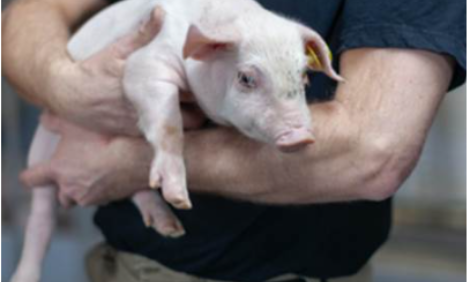



Immune Response of Piglets on a PRRSV Vaccination
This work sheds light on the development of the immune system in piglets following vaccination against Porcine Reproductive and Respiratory Syndrome virus (PRRSV). Three feed additives had no effects on the pigs immune responses.Selected feed additives were tested with regard to their impact on a vaccination with PRRSV by S. Speiser and others and their paper was published in Livestock Science recently.
They detected cytotoxic T cells and specific interferon γ-producing cells in response to the immunisation but no effect of the feed additives were observed under these conditions.
The study adds information about the development of the piglets’ immune system, the researchers concluded.
The immune response of piglets to a vaccination against the Porcine Reproductive and Respiratory Syndrome Virus (PRRSV) was tested after feeding different feed additives.
The trial included four groups of 10 piglets and lasted 39 days.
Feed additives were added to a control diet. Tested substances included:
- an autolysed yeast preparation from Saccharomyces cerevisiae at 0.2 per cent
- dried bovine colostrum at 0.9 per cent and
- the probiotic Bacillus cereus var. toyoi NCIMB 40112 at 109 colony-forming units per kg diet.
Three-week-old piglets were vaccinated against PRRS-Virus, blood samples were taken before vaccination and seven, 21 and 35 days after vaccination for complete blood counts, flow cytometry for phenotyping of different lymphocyte subsets in peripheral blood, measurement of specific IgG antibodies and ELISpot assay to detect specific interferon γ-producing lymphocytes.
Animal performance was not affected by the experimental diets.
Haematological parameters and complete blood counts displayed time-dependent changes, feed-related effects were not observed.
The analysis of the expressed lymphocyte surface markers showed distinct time-dependent shifts but no dietary effects.
CD4−CD8α+ cells reached highest levels on day 21 post vaccination and decreased thereafter (P=0.037), the CD2+CD5− cells decreased in all groups towards day 35 (P<0.001).
CD2+CD5+ cells were determined at constant levels during the observation period, while CD2−CD5+ decreased at day 21 (P=0.039) and CD4+CD8α? cells decreased over time (P=0.003).
CD4+CD8α+-double positive cells increased age-dependently in all groups (P=0.006) but CD21+ cells and CD14+ cells were not affected by age.
Increasing levels of specific IgG were determined (P<0.001) but group effects could not be demonstrated as for the interferon γ-producing T cells.
The development of the immune system in piglets seems to follow a typical time-dependent pattern, the lack of dietary effects on the immune response in this trial might be due to a balanced diet and appropriate sanitary conditions.
Reference
Speiser S., L. Scharek-Tedin, A. Mader, A. Saalmüller, W. Gerner, K. Männer, K. Stadler and J. Zentek. 2015. Immune response of piglets on a PRRSV vaccination &nash; Altered by different feed additives? Livestock Science. 174:96-104.
Further Reading
You can view the full report (fee payable) by clicking here.
Find out more information on PRRS by clicking here.
May 2015








